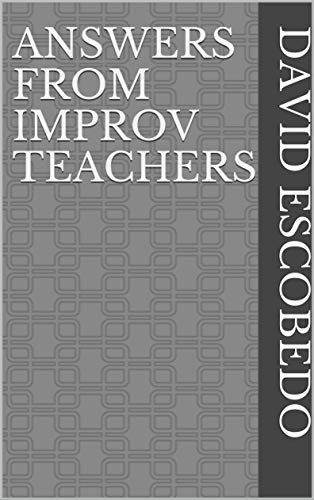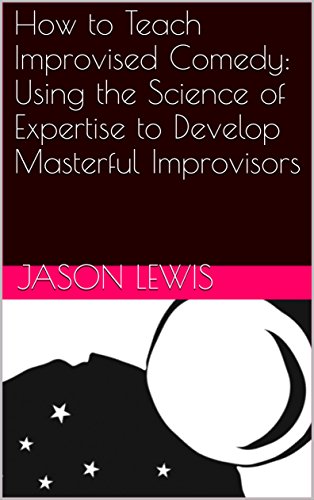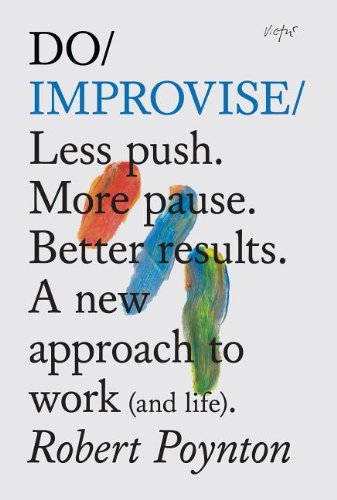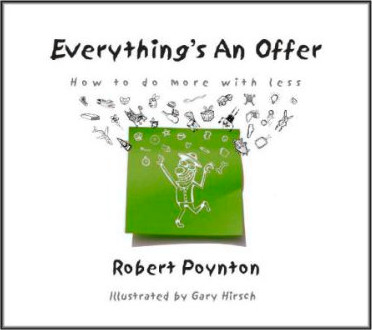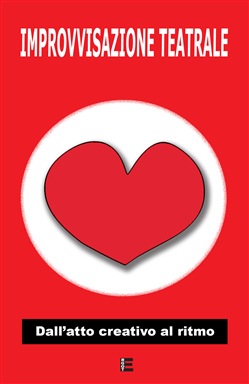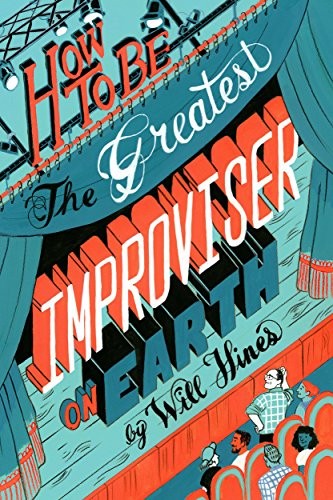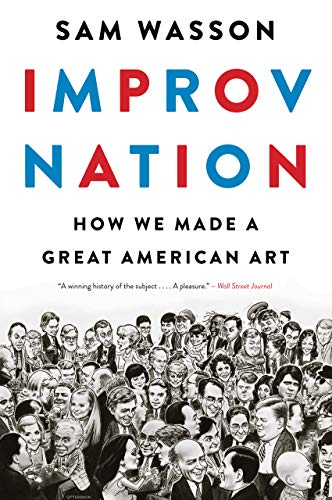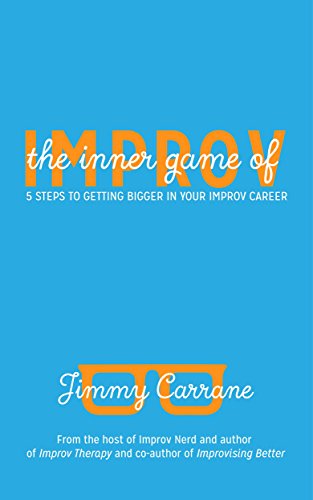David Escobedo, a recent Hollywood transplat, asked the popular improv teachers from all over England common questions found in improv. The diversity of their answers offers different views and insight that can help you on your improv journey. Great content to quote for research or creating online content for your own improv page.
Books
“How to Teach Improvised Comedy: Using the Science of Expertise to Develop Masterful Improvisors” de Jason Lewis Use the Science of Expertise in your Improv teaching practice to create better improvisors, faster. Learn how expert improvisors are really made, the one tool that trumps a class “purpose”, how to design drills that work, and how most improv teachers are side-coaching incorrectly. With 53 specific, usable tools this book will improve your improv coaching, directing or teaching right away. Each tool is backed by research and uses the latest findings in neuroscience, education, sport and the arts to make a difference.
Do Improvise: Less Push. More Pause. Better Results. A New Approach to Work (and Life) (Do Books) -Robert Poynton Everyday we deal with the unplanned and the unexpected – from a broken toaster to losing (or gaining) a major client. Our natural ability to improvise gets us through. But we feel as if we’re winging it, rather than acting with courage and conviction. Robert Poynton teaches an acclaimed method to some of the world’s biggest brands and companies. Improvisational skills that an actor might use on stage are honed and applied to the everyday business of work and life. The end result is a new approach that embraces change as a natural process and has creativity and innovation at its heart. With killer games to put the theory into practice, Do Improvise will help you: • Become more productive without trying harder • Overcome creative blocks and generate new ideas • Respond fluently to circumstances beyond your control • Inspire and motivate others Not sure what to do next? Improvise.
Everything s an Offer’ tells the story of one business person’s adventure in the world of improvisational theatre. It explains how the practises improv is based on can help you make more with what you have, using less effort, less energy and less resources (whilst creating less difficulty and stress). It illustrates, with myriad examples and stories, how anybody leading a busy and complicated life can put these ideas into action and why doing so will help them lead a more satisfying, creative and sustainable life. It extends the applications of improv far beyond team building and offers a new language for thinking about how we go about business – a language that has been used by Fortune 500 companies such as Nike, Intel and FedEx to help them communicate better, build stronger relationships (internally or with customers), propel people into action and get to new ideas and solutions.
First published by curated Italian authors on the subject, carried out by the Improvvvisart cooperative. A text dedicated to the world of Improvvisazione Teatrale, first volume of the collana “I colori dell’Improvvisazione”, realized with the contribution of the greatest Italian teachers and with the support of the Associazione Nazionale Improteatro. The collana intends to offer testimony and give merit to the path of the growth and maturation of the modern concept of Improvvisazione Teatrale in Italia. L’improvvisazione oggi è in fermento, in continual evolution, in crescita. There are always numbers of the school, the company, the spettacoli, the national rade, and the festival in Italy. The first volume goes directly to the “cuore” of the improvised theater: the creative atmosphere, the environment, the persona, the relationship and the rhythm of an improvised story. The authors of this volume are: Mari Rinaldi (Teatribù – Milano), Luca Gnerucci (Teatro a Molla – Bologna), Daniele Marcori (Qfc Teatro – Rome), Tiziano Storti and Susanna Cantelmo (Verba Volant – Rome).
Become great at performing long-form improv! We skip the basics and get into advanced topics like: being truly present, being authentic, dealing with difficult performers, being actually funny (!) and the rarely discussed but essential skill of being healthy. This book was written by a long-time teacher and performer from the Upright Citizens Brigade Theatre based on his years of teaching and directing people to improvise. Even FAMOUS PEOPLE have studied with him!
In this richly reported, scene-driven narrative, Sam Wasson charts the meteoric rise of improv from its unlikely beginnings in McCarthy-era Chicago. We witness the chance meeting between Mike Nichols and Elaine May, hang out at the after-hours bar where Dan Aykroyd hosted friends like John Belushi, Bill Murray, and Gilda Radner, and go behind the scenes of cultural landmarks from The Graduate to The Colbert Report. Along the way, we befriend pioneers such as Harold Ramis, Chevy Chase, Steve Carell, Amy Poehler, Alan Arkin, Tina Fey, Judd Apatow, and many others. Wasson shows why improv deserves to be considered the great American art form of the last half century.
As an improv comedian: are you a pirate, robot or ninja? Know your type so you can appreciate your strengths while also focusing on what you have left to learn. This book is 200 pages of lessons, exercises and metaphors designed by two teachers and performers from the Upright Citizens Brigade Theatres in New York and Los Angeles. Also, it’s written as a fable where you are an “improv seeker” in an mysterious dojo hidden in the mountains. That’s pretty fun! “Billy and Will love to do the ‘make’em ups’ and they’re quite good at it as well. I would read this book…if I could read.” – Rob Riggle (Daily Show, US Marine Corps)
“Mick has been the catalyst for the most messed-up, funny, smart, low-budget, loud, subversive, hilarious, mind-expanding improv shows of his time.”. Bob Odenkirk, star of “Better Call Saul”. In this follow-up to his highly regarded book “Improvise. Scene from the Inside Out” globally acclaimed improviser, director, and instructor Mick Napier focuses on the complexities and theories of long form improvisation. This extended form of improvisation invites performers to be inspired for at least thirty minutes by a single suggestion as they push their creativity to the limit. Napier taps into more than 30 years of experience and distills his tools for success into practical, engaging lessons: – The art of introductions and edits – Different approaches to openers – Pros and cons of the back line – Why it’s okay to be funny – Finding the dominant energy – Sustaining a strong character
The Inner Game of Improv: 5 Steps to Getting Bigger in Your Improv Career Do you think that to get a bigger career in improv you have to run off to one more class or one more show? If so, you may be running in the wrong direction. If you want to have a bigger career in improv and you can quite figure out why you’re stuck, you may need to search inside for the answers. In this straight-forward, easy-to-read book, improv teacher Jimmy Carrane, co-author of Improving Better, author of Improv Therapy and host of the Improv Nerd podcast, has identified five things that often prevent improvisers from having a bigger career: perfectionism, resentments (and expectations), low self-esteem, playing small, and not taking care of yourself. Carrane combines real-world advice and practical tools with personal stories from his more than 30 years of teaching and performing at Second City, iO Chicago and The Annoyance Theatre to help you recognize and let go of each of these character traits so you can get more opportunities and make the most out of your improv career.
